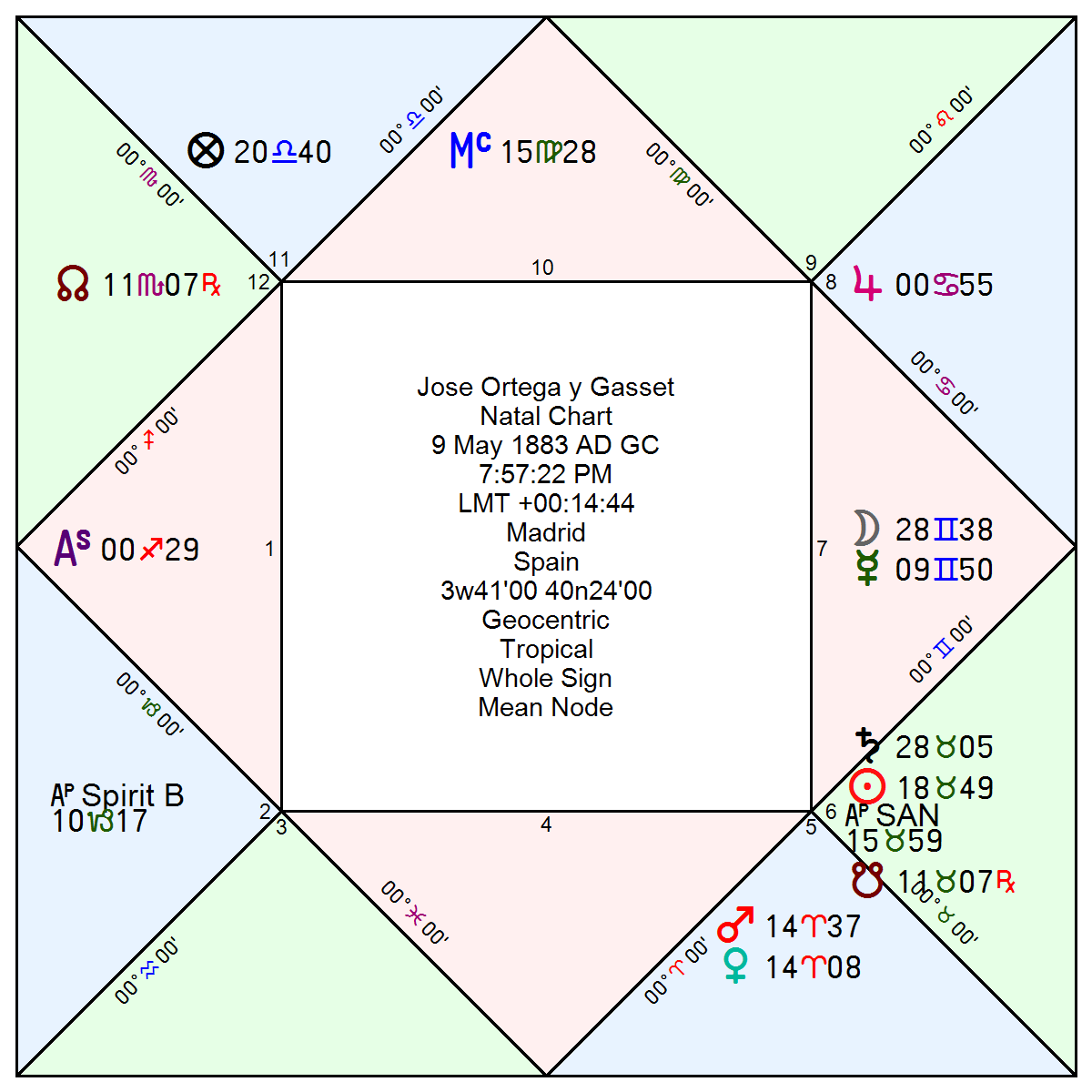Jose Ortega y Gasset (1883-1955)
Jupiter in Cancer = psychology of the masses + humanistic education
Published in 1930, The Revolt of the Masses by Jose Ortega y Gasset sits besides Hannah Arendt’s The Origins of Totalitarianism on my bookshelf. In my view, it ranks among the best explorations of mass social psychology. Like Arendt, Ortega’s natal horoscope features Jupiter in Cancer which affords him key insights on social movements.
ChatGPT synopsis of The Revolt of the Masses.
The Revolt of the Masses (1930) was written during the fragile interwar period in Europe. Liberal democracy was in crisis, sandwiched between the failures of the old monarchies and the rise of authoritarian ideologies. Ortega y Gasset, a Spanish philosopher and public intellectual, was witnessing firsthand the social upheavals that would soon give way to both fascism and communism. In Spain, parliamentary institutions were weakening, and Ortega feared that mass political participation—unmoored from tradition or education—was veering toward anti-intellectual tyranny.
His core thesis: the 20th century had ushered in the rise of the “mass man”—a type of person who, despite living in the comforts afforded by liberal civilization, disdains the values, disciplines, and elites that made those comforts possible. The mass man is not defined by economic class but by attitude: self-satisfied, entitled, and uninterested in self-improvement or complexity. Democracy, in Ortega’s warning, degenerates when this kind of person demands authority without responsibility and uses the state as an extension of his will, not as a shared framework of reasoned governance.
In today's U.S. political landscape, Ortega’s warnings ring sharply. Populism on both the left and right often rejects expertise, procedural norms, and pluralism—hallmarks of what Ortega saw as civilization itself. From anti-scientific sentiment during the pandemic to disdain for institutional checks and balances, the “massification” of political culture is not just an old-world worry. The challenge remains: Can a democracy survive when too many citizens reject the burdens of thought that democracy demands?
José Ortega y Gasset was born on May 9, 1883, in Madrid, Spain, into a prominent liberal and journalistic family. He studied philosophy at the University of Madrid and then in Germany, where he absorbed the Neo-Kantianism of the Marburg School and the phenomenology of Husserl. This dual background—rigorous German philosophy combined with a Mediterranean literary style—shaped his lifelong project: to create a philosophy accessible to society at large while addressing Spain’s cultural and political crisis in the early 20th century.
Ortega became a professor of metaphysics at the University of Madrid in 1910, quickly gaining renown as a gifted lecturer and writer. He founded journals such as Revista de Occidente, which became a vehicle for bringing European intellectual currents into Spain. His thought stressed the interdependence of the individual and historical circumstance, summed up in his famous dictum: “Yo soy yo y mi circunstancia” (“I am I and my circumstance”). For Ortega, philosophy had to grapple with the concrete conditions of life, not abstractions detached from human existence.
During the 1920s and 1930s he emerged as Spain’s most influential public intellectual. His works include “Meditaciones del Quijote” (1914), “España invertebrada” (1921), and his international classic “La rebelión de las masas” (The Revolt of the Masses, 1930), which diagnosed the rise of mass society and warned of the dangers of conformity, mediocrity, and authoritarian politics. In politics, Ortega was a liberal reformer: he supported the Spanish Republic in 1931, served briefly as a deputy in the Cortes, but grew disillusioned with partisan strife.
The Spanish Civil War (1936–1939) forced him into exile in France, Argentina, and Portugal. He returned to Madrid in 1945 but remained cautious under Franco’s dictatorship, focusing on scholarship rather than politics. In exile and afterward he continued to write essays and lectures on themes of history, reason, and vitalism, developing what he called “raciovitalismo”—the philosophy that reason must always be grounded in life itself.
Ortega y Gasset died in Madrid on October 18, 1955. His legacy endures as Spain’s foremost modern philosopher and one of Europe’s leading cultural critics of the 20th century. His writings continue to resonate for their lucid style, cultural breadth, and profound insights into the tension between individuality, circumstance, and mass society.
ADB Rodden Rating DD, Alternative birthtime listing 8:35 PM, ASC 8SA04
Proposed rectification: 7:57:22 PM, ASC 00SA29'12"
Rectification details available in excel workbook (Paid subscriber member benefit)
Victor Model: Jupiter/Cancer
Bound lord of the Ascendant, Sun, Lot of Fortune, Lot of Spirit, and Syzygy.
Jupiter in Cancer is the sign of Jupiter’s exaltation.
Positioned 10 signs from the Lot of Fortune, rules the Lot by bound.
Moon applies to Jupiter in an out-of-sign aspect.
Physigonomy Model: Sagittarius, Cancer
Sagittarius as rising sign and decan: Long face marked by lines above and below the mouth which outline the shape of a diamond when laughing, a.k.a. the classic ‘Joker’ smile from the Batman series.
Cancer as the sign placement of Jupiter, ruler of the rising sign and decan: round white hat
Moon’s Configuration: Separates from Mars and applies to Jupiter, nocturnal, waxing
Configuration is consistent with Ortega moving away from militarism in favor of the study of mass pyschology + the necessity for intellectuals to take a moral stance for society’s development. The latter is a match to Ortegas’s Group at the Service of the Republic on January 7, 1931 which offered an intellectual framework for Spain’s Second Republic. Ortega also advocated for humanistic education exemplified by the Institute of Humanities in Madrid, co-founded with Julián Marías in 1948.
For a nocturnal figure Mars is the in-sect malefic and Jupiter is the out-of-sect benefic. This degrades the Moon’s configuration because it strengthens the power of his militant enemies and weakens his ability to escape them with Jupiterian philosophy. Over the course of his life, his Jupiterian achievements were notable but fleeting when compared to the relative duration of militant dictatorial Spanish rule.
The waxing Moon, 1st quarter, signifies growth. This is consistent with Ortega’s ability to translate academic metaphysics into public policy initiatives circulated at the highest level of national politics; however, they did not blossom outside a relatively narrow set of adherents to humanistic philosophy. Whether this limit of his political reach can be tied to Jupiter as the out-of-sect benefit (e.g., out-of-favor political party) or a relatively young Lunar phase is uncertain.
AI Notice: ChatGPT contributed to this article.
Keep reading with a 7-day free trial
Subscribe to House of Wisdom to keep reading this post and get 7 days of free access to the full post archives.



